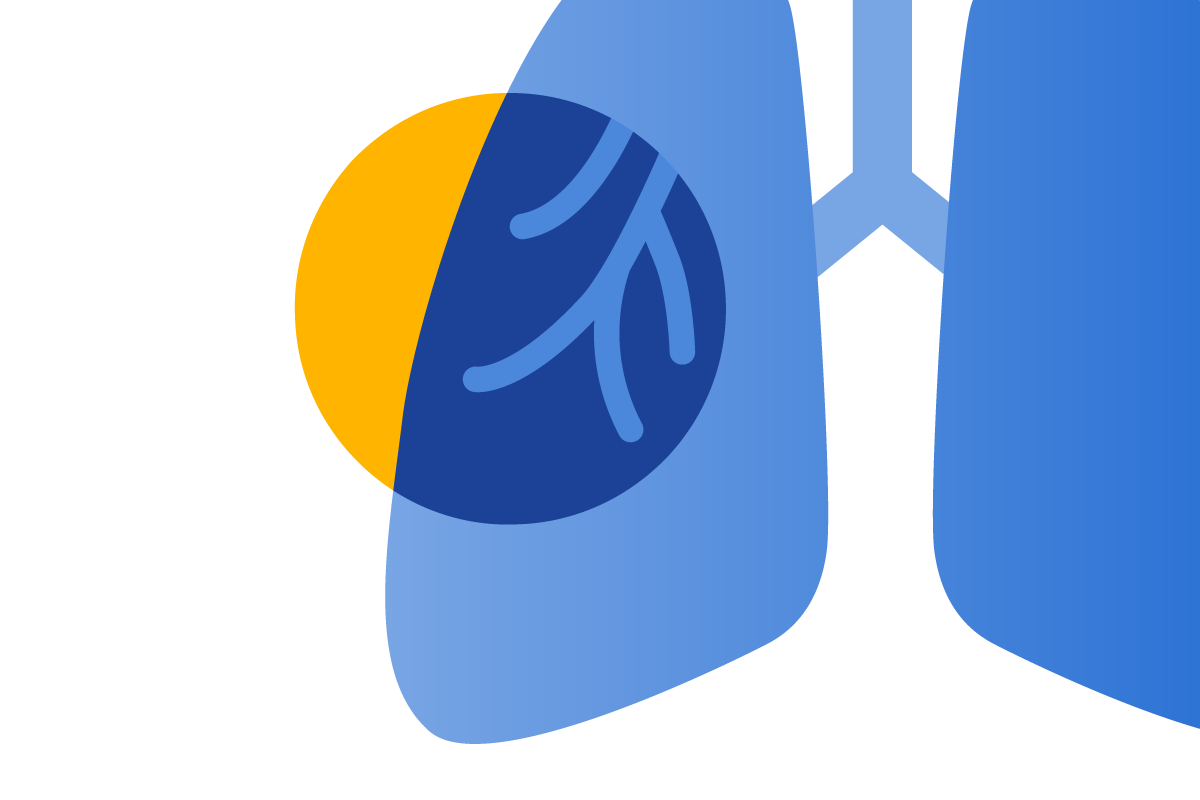
Convenient lung screenings in Indiana
Your lung health is important. Whether you need a lung screening, or care for a lung nodule or cancer, the Ascension St Vincent Lung Nodule Clinic is here for you. Our team of specialists uses advanced diagnostic imaging, biopsy procedures and treatment options. We start by listening to you, to better understand your health. The Lung Nodule Clinic is here for you to guide you through further evaluation of a nodule found in your lungs. Some nodules are benign, or noncancerous, and only need periodic follow-up. Other nodules may be precancerous or cancerous. We provide biopsies to help make an accurate diagnosis and work with oncologists to create a personalized treatment plan.

Screen early. Breathe easy.
If you're above 50 and currently smoke or have quit smoking, a lung scan is key to knowing your risk of lung cancer.

Getting a low-dose CT scan may help find lung nodules or cancer early, when it is most treatable. Finding cancer early means there may be more options for treatment too. At Ascension St. Vincent Lung Nodule Clinic in Indianapolis and Evansville, Indiana, we deliver advanced screening and surveillance of lung nodules and cancer. A lung scan can also help diagnose lung fibrosis, COPD and other breathing disorders.
If you meet the criteria below, ask your doctor if a lung screening is right for you:
- Are between age 50 and 80
- Currently smoke, or have quit within the past 15 years
- Have smoked 2 packs daily for 10 years or 1 pack daily for 20 years
- Do not currently have signs or symptoms of lung cancer
A referral from your primary care doctor or other provider is needed for a low-dose CT scan. If you already have a referral, please call to schedule your screening appointment.
Understanding a low-dose CT screening
CT lung screenings use an X-ray generating device that rotates around your body and a powerful computer to create cross-sectional images of the inside of your lungs. When you arrive for your test, you will change into a gown and lie on a table that slides in and out of a large tube, called a CT. It is a painless imaging test that takes only minutes to complete. Then, your radiologist reviews the images and prepares a report for your doctor. A member of our care team will contact you to discuss the results. By getting a clear picture of your lung health, your doctor can create a care plan that’s right for you.
Medicare and many private insurers may cover a CT scan for those at high risk. And for many high-risk patients, the first scan may be covered without a copay. Check with your insurance provider for confirmation of coverage.
Connected to compassionate cancer care
Some nodules are non-cancerous and only need to be monitored, while others may be cancerous and need treatment. If you are diagnosed with lung cancer, we’re here for you. Our team of multi-disciplinary specialists include pulmonologists, a nurse practitioner specializing in lung disease, interventional radiologist, surgical oncologists, medical oncologists, radiation oncologists and patient navigators. We work together to deliver care that’s right for you.
- Pulmonologist - A doctor who specializes in diagnosing and treating lung conditions. Pulmonologists help evaluate lung nodules.
- Thoracic surgeon - A surgeon with specialized surgical care for the lungs, heart and esophagus.
- Medical oncologist - A doctor who specializes in treating cancer using chemotherapy, hormonal therapy, biological therapy and targeted therapy. Medical oncologists are often the main health care provider for someone with cancer.
- Radiation oncologist - A doctor who specializes in using radiation therapy to treat cancer.
- Interventional radiologist - A doctor who specializes in minimally invasive, image-guided surgery with the use of CT, ultrasound, MRI and fluoroscopy.
- Nurse practitioner - A registered nurse with advanced training. Nurse practitioners assess your needs, order and interpret diagnostic and laboratory tests, diagnose diseases, and create treatment plans.
- Patient navigator - nurses and support team members who guide patients and families during treatment and recovery.
Cutting-edge technology
When you choose Ascension St. Vincent Lung Nodule Clinic for your care, you have access to the latest technology used to diagnose, treat and monitor lesions in the lung. When lesions are detected and further testing is required, we use the advanced methods to evaluate the lesions, such as robotic bronchoscopy and biopsy, CT-guided biopsy, endobronchial ultrasound (EBUS), and EBUS with biopsy. Robotic bronchoscopy helps your doctor reach deep into the lung to biopsy the smallest of lesions. From identification to diagnoses, Ascension St Vincent is ready to provide the care you need.
Our teams at the Lung Nodule Clinics use the latest software to allow lung specialists to provide you with timely surveillance of nodules that need monitoring for a period of time. In most cases, monitoring of small lesions will be done yearly by getting a CT scan of the chest. Monitoring allows the team to detect change and intervene quickly to evaluate the change in the nodule.
Get a second opinion from a pulmonologist or thoracic surgeon
There’s a lot to think about when you’re facing a cancer diagnosis and deciding on a treatment plan. Getting a second opinion not only provides more information about your condition, but it may also increase your confidence in your care plan.
If you’re looking for help with a second opinion, we're here for you. We can match you with the right specialist.